Crews are searching for bodies in stranded cars and buildings as people tried to salvage what they could from their ruined homes following flash floods in Spain that claimed at least 155 lives.
Spain’s worst natural disaster this century left a trail of destruction and fears that more horrors will be uncovered from the layers of mud that walls of water left in their wake late on Tuesday and early Wednesday.
An unknown number of people remain missing.
“Unfortunately, there are dead people inside some vehicles,” said Spain’s transport minister Oscar Puente.
The widespread damage recalled the aftermath of a hurricane or tsunami.

Cars piled on one another like fallen dominoes, uprooted trees, downed power lines and household items all mired in mud that covered streets in dozens of communities in the hardest-hit region of Valencia, where at least 92 people died.
Rushing water turned narrow streets into death traps and spawned rivers that tore through homes and businesses, sweeping away cars, people and everything else in its path. The floods demolished bridges and left roads unrecognisable.
Luis Sanchez, a welder, was one of the lucky ones when the storm turned the V-31 highway south of Valencia city into a floating graveyard strewn with hundreds of vehicles. He said he saved several people.
“I saw bodies floating past. I called out but nothing,” Mr Sanchez said.
“The firefighters took the elderly first, when they could get in. I am from nearby so I tried to help and rescue people. People were crying all over, they were trapped.”
Regional authorities said late on Wednesday it seemed no-one was left stranded on rooftops or in cars in need of rescue after helicopters had saved some 70 people.

“Our priority is to find the victims and the missing so we can help end the suffering of their families,” Spanish prime minister Pedro Sanchez said after meeting with regional officials and emergency services in Valencia on Thursday, the first of three official days of mourning.
Spain’s Mediterranean coast is used to autumn storms that can cause flooding, but this was the most powerful flash flood event in recent memory.
Scientists link it to climate change, which is also behind increasingly high temperatures and droughts in Spain and the heating up of the Mediterranean Sea.
The greatest pain was concentrated in Paiporta, a community of 25,000 next to Valencia city where mayor Maribel Albalat said that 62 people had died.
“(Paiporta) never has floods, we never have this kind of problem. And we found a lot of elderly people in the town centre,” Mr Albalat told national broadcaster RTVE.
“There were also a lot of people who came to get their cars out of their garages … it was a real trap.”

While the most suffering was inflicted on municipalities near the city of Valencia, the storms unleashed their fury over huge swathes of the south and eastern coast of the Iberian peninsula.
Two fatalities were reported in the neighbouring Castilla La Mancha region and one in southern Andalusia.
The regional president for Castilla La Mancha, Emilion García-Page, said that at least one Guardia Civil police officer was among several missing people in the town of Letur.
Homes were left without water as far southwest as Malaga in Andalusia, where a high-speed train derailed on Tuesday night although none of the nearly 300 passengers were hurt.
Greenhouses and farms across southern Spain, known as Europe’s garden for its exported produce, were also ruined by heavy rains and flooding. The storms spawned a freak tornado in Valencia and a hail storm that punched holes in cars in Andalusia.
Heavy rains continued Thursday farther north as the Spanish weather agency issued a red alert for several counties in Castellon, in the eastern Valencia region, and for Tarragona in Catalonia. An orange alert was issued for southwest Cadiz.
“This storm front is still with us,” the prime minister said. “Stay home and heed the official recommendation and you will help save lives.”
More than 1,000 soldiers from Spain’s emergency rescue units joined regional and local emergency workers in the search for bodies and survivors. The soldiers had recovered 22 bodies and rescued 110 people by Wednesday night.
“We are searching house by house,” Angel Martinez, with a military emergency unit, told Spain’s national radio broadcaster RNE from the town of Utiel, where at least six people died.
Some 150,000 people in Valencia were without electricity on Wednesday, but roughly half had power by Thursday, Spanish news agency EFE reported.
An unknown number did not have running water and were relying on whatever bottled water they could find.
The region remained partly isolated with several roads cut off and train lines interrupted, including the high-speed service to Madrid, which officials say won’t be repaired for two to three weeks.
The violent weather event surprised regional government officials.
Spain’s national weather service said it rained more in eight hours in the Valencian town of Chiva than it had in the preceding 20 months, calling the deluge “extraordinary.”




Comments: Our rules
We want our comments to be a lively and valuable part of our community - a place where readers can debate and engage with the most important local issues. The ability to comment on our stories is a privilege, not a right, however, and that privilege may be withdrawn if it is abused or misused.
Please report any comments that break our rules.
Read the rules here